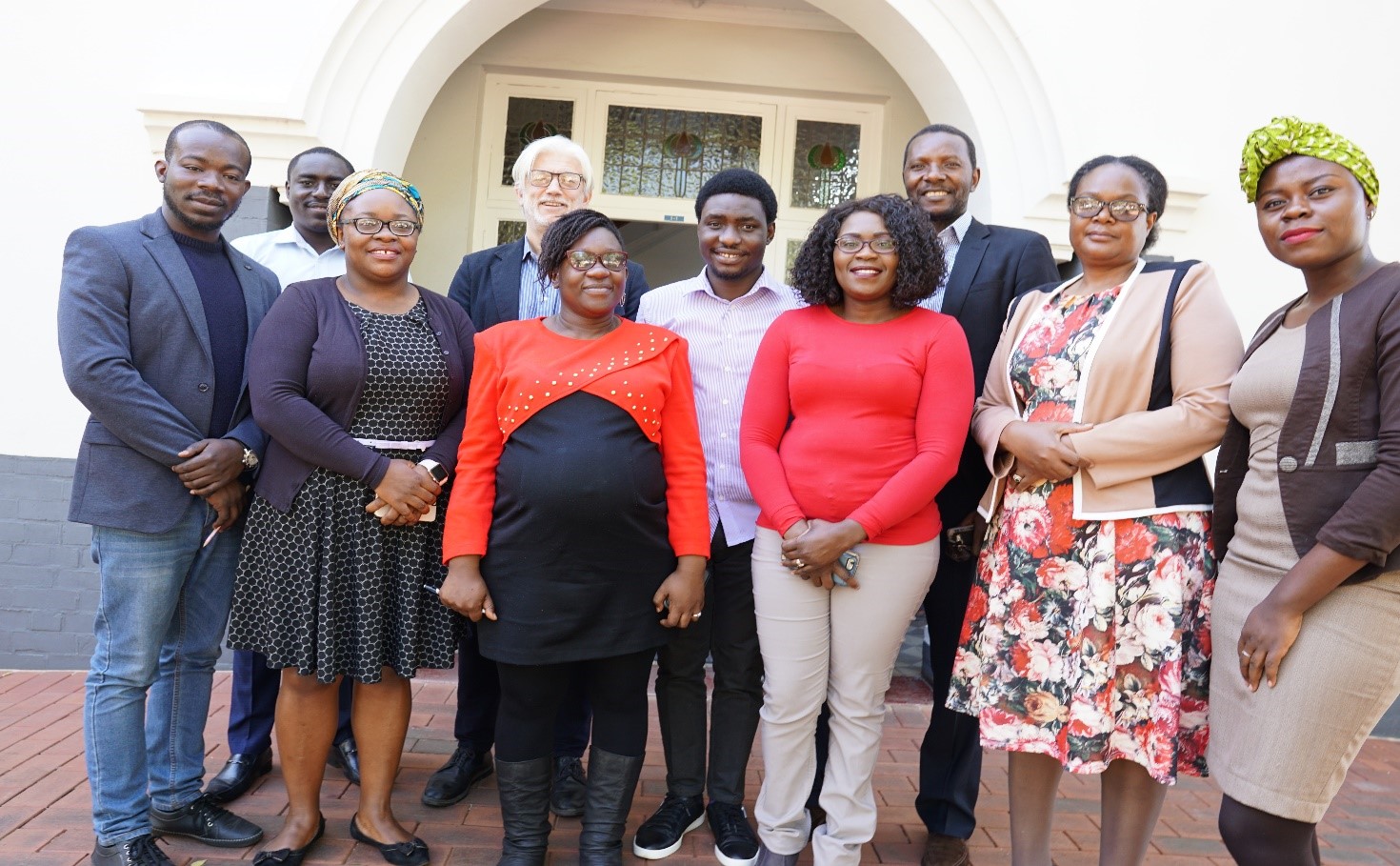Over the years, it has been increasingly realised that litigation of human rights abuses is not an end to the realisation of human rights for victims of abuses. In most cases, litigation is perhaps the beginning of a long chain of process towards ensuring justice for victims of human rights violations. The Centre for Human Rights has engaged in different projects to raise awareness and improve the implementation of decisions of human rights bodies. Some of the implementation projects in which the Centre has been involved are:
Implementation of decisions of African Commission on Human and Peoples’ Rights (ACHPR) against the government of Zimbabwe
This project is a follow-up on the implementation of six decisions of the ACHPR against Zimbabwe.
The six decisions are:
1. Com. 297/2005: Scanlen & Holderness v Zimbabwe
2. Com. 294/2004: Zimbabwe Lawyers for Human Rights and the Institute for Human Rights and Development (on behalf of Andrew Barclay Meldrum) v. Republic of Zimbabwe
3. Com. 288/04: Gabriel Shumba V Zimbabwe
4. Com. 295/04 Noah Kazingachire, John Chitsenga, Elias Chemvura and Batanai Hadzisi (represented by Zimbabwe Human Rights NGO Forum v Zimbabwe,
5. Com. 284/03 Zimbabwe Lawyers for Human Rights and Associated 4 Newspapers of Zimbabwe v Zimbabwe
6. Com. 245/02: Zimbabwe Human Rights NGO Forum v Zimbabwe
 The Centre for Human Rights initiated a national dialogue in the form of an engagement with Zimbabwe government officials and civil society actors. The core objectives of the dialogue are to find out the status of implementation of decisions of the ACHPR against Zimbabwe and to establish joint mechanisms for implementation between government and civil society actors. Pursuant to the objectives of the national dialogue, on 24 May 2018, the Centre hosted a planning meeting with representatives from the Zimbabwe Lawyers for Human Rights (ZLHR), Zimbabwe Human Rights NGO Forum (ZHRF) and the Zimbabwe Human Rights Commission (ZHRC).
The Centre for Human Rights initiated a national dialogue in the form of an engagement with Zimbabwe government officials and civil society actors. The core objectives of the dialogue are to find out the status of implementation of decisions of the ACHPR against Zimbabwe and to establish joint mechanisms for implementation between government and civil society actors. Pursuant to the objectives of the national dialogue, on 24 May 2018, the Centre hosted a planning meeting with representatives from the Zimbabwe Lawyers for Human Rights (ZLHR), Zimbabwe Human Rights NGO Forum (ZHRF) and the Zimbabwe Human Rights Commission (ZHRC).
Additionally, in 2012, the African Commission in the case of COM. 288/04: GABRIEL SHUMBA V ZIMBABWE held that the government of Zimbabwe has violated the rights of the Complainant under article 5 of the African Charter on Human and Peoples’ Rights. The Commission directed the government of Zimbabwe to pay adequate compensation to the Complainant for the torture and trauma caused by agents of the government of Zimbabwe. The Commission also requested that an inquiry and investigation be carried out by the government of Zimbabwe to bring the perpetrators of the violations to justice.|
On 18 July 2014, the Complainant through his Lawyers informed the Bureau of the African Commission of the non-implementation of the decision of the Commission in the Shumba’s case. The complainant attached a memorandum in which an attempt was made at quantifying damage in order for the state to determine the amount of compensation to be paid in the implementation of the remedial order of the Commission.
By a letter dated 29 March, 2016, the Centre requested the African Commission, pursuant to Rule 112 of the Commission’s 2010 Rules of Procedure to follow up with the Government of Zimbabwe about the measures taken to implement the decision of the Commission in the Shumba case. The Centre also requested the Commission to reiterate the need for Zimbabwe to take the measures indicated in paragraph 194 of the decision, and that in doing so, it be informed and guided by the information and contentions in the memorandum provided by the Complainant. The Centre further requested the Commission to invite the concerned parties to an oral hearing to bring the issue of implementation to finality. The request of the Centre was noted in paragraph 21 of the 37th Activity Report of the Commission, in which the Commission resolved to consider the issue at its upcoming session. The Commission also informed the Centre by a letter dated 18 April 2016 and ACHPR/COMM/669/16 that the matter would be tabled for consideration and the Complainant would be informed of the outcome. By another letter dated 21 June 2016 and referenced ACHPR/COMM/288/04/ZW/1156/16, the Commission informed the complainant that it would follow up with the government of Zimbabwe on the measures taken to implement the Commission’s decision.
By another letter dated 15 April 2017, the Centre requested the Commission to provide information about subsequent follow-up actions; or, in the absence of any measures taken or information provided, urged the Commission, to as promptly as possible, re-engage with the government of Zimbabwe in the form of an implementation hearing towards securing speedy implementation, and to hold a hearing during its forthcoming session to resolve the issue.
As part of the Centre’s advocacy campaign on the implementation of the decisions of the African Commission against the government of Zimbabwe, the Centre drafted flyers advocating for the implementation of the decision of the Commission in Com. 288/04: Gabriel Shumba v Zimbabwe: The Centre also produced an advocacy video that featured Prof. David Padilla and Mr Gabriel Shumba amongst others calling on the government of Zimbabwe to implement the decision of the African Commission; and requesting the African Commission to take necessary steps to ensure that its decisions are respected and implemented.
Unfortunately, the government of Zimbabwe is yet to comply with the decision of the African Commission in the Shumba’s case and efforts are still ongoing to ensure implementation.
Implementation of decision of the African Committee of Experts on the Rights and Welfare of the Child (African Children’s Committee) in Com/002/2009 The Centre for Human Rights (University of Pretoria) and La Rencontre Africaine pour la Defense Des Droits de l’homme (Senegal) V. The Government of Senega
In 2014, the African Children’s Committee found that the failure of the government of Senegal to protect the rights of Talibes constituted a violation of numerous articles of the African Children’s Charter. The African Children’s Committee recommended that the government of Senegal establishes minimum norms and standards for all daaras relating to health, safety, curriculum, and quality; integrate the daaras into the formal education system; inspect the daaras regularly to ensure they meet minimum standards; and ensure the provision of free and compulsory education. Since the decision of the African Children’s Committee, the Centre has been involved in different activities with partner NGOs to follow-up and facilitate the full compliance of the government of Senegal with the decision of the African Children’s Committee.
According to the African Children’s Committee’s Rules of Procedure a State Party to a Communication is required to report on the implementation of its decisions. The Government of Senegal therefore submitted its report on the implementation of the Talibe decision and this report was considered during an implementation hearing held at the African Children’s Committee 29th session in May 2017, in Lesotho. As part of its follow-up efforts on the implementation of the decision, the Centre for Human Rights and La Rencontre Africaine pour la Defense des Droits de l’Homme (RADDHO), presented a joint submission to the Committee on the status of implementation of the decision by the government of Senegal at the African Children’s Committee 29th session in Lesotho. In the joint presentation before the Committee, the Centre and RADDHO noted that interventions by the Senegalese government are still limited to Dakar (the capital), despite the Talibe issue being a national problem that goes beyond the capital. The Centre and RADDHO also informed the Committee that government interventions are also ineffective as many Talibe children are still on the streets. A draft law meant to address this problem is taking too long to be adopted by the Senegalese Parliament. The joint submission advocated for the African Children’s Committee to follow up more closely in order to ensure that the Government of Senegal complies with its decision. The joint presentation informed the exchanges between the African Children’s Committee and the Government of Senegal. Based on the implementation issues identified in the joint presentation, the African Children’s Committee made further recommendations to accelerate the implementation of the Talibe decision. CSOs and other stakeholders present during the implementation hearing were also informed of the status of implementation and called upon to engage in the follow-up process.
At the 33rd session of the African Children’s Committee in Addis Ababa, 2019, the Centre informed the Committee of the its intention to develop a documentary on the Committee’s decision in the Talibe Children’s case to highlight the process, potential and challenges of the use of the complaints mandate and processes of the Committee. The follow-up activity of the Centre and the documentary initiative was reported by the Committee in its 33rd session report.
As part of its efforts to improve awareness and ensure the full implementation of the decision of the African Children’s Committee in the Talibe case, the Centre is working on a video documentary showcasing the process related to the Talibe case, from case identification to the implementation of the decision; raise awareness on the communications procedure of the African Children’s Committee and advocate for the use of the African Children’s Committee communication procedure by organisations working on children’s rights.
Webinar on the implementation of decisions and judgments of African human rights organs
On 11 March 2021, the Human Rights Implementation Centre at the University of Bristol and the Centre for Human Rights at the University of Pretoria, held a webinar on the implementation of decisions and judgments of the African Commission on Human and Peoples’ Rights, African Court on Human and Peoples’ Rights and the African Committee on the Rights and Welfare of the Child.
Background
The African Commission on Human and Peoples’ Rights (ACHPR), the African Court on Human and Peoples’ Rights (ACtHPR) and the African Committee of Experts on the Rights and Welfare of the Child (ACERWC) have all developed strategies for monitoring the implementation of their decisions and judgments, as reflected in their respective Rules. There has been significant innovation and tools adopted by the ACHPR, ACtHPR & ACEWRC including through holding hearings, gathering information from other stakeholders and adopting resolutions and interpretive judgments providing assistance to states. Recent changes to rules of procedure offer new ways of monitoring implementation.
Aims
The webinar enabled the three organs to explain in detail their approaches towards implementation and their future plans, as well as some of the challenges they face. The webinar was recorded and made public so as to enable relevant stakeholders to understand more about the ACHPR, ACtHPR & ACEWRC approaches.
Format
The webinar heard presentations from Judges, Commissioners, Committee members and representatives of the Registry and their Secretariats. The presentations outlined the work that the respective body has been doing on monitoring implementation of its decisions or judgments.


